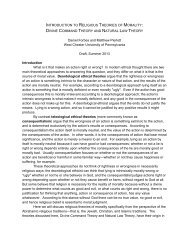Introduction to Religious Theories of Morality
You also want an ePaper? Increase the reach of your titles
YUMPU automatically turns print PDFs into web optimized ePapers that Google loves.
e important <strong>to</strong> its survival. Given these facts, it seems that diversity must have a significant<br />
role <strong>to</strong> play in moral judgment, but NLT does not provide any obvious way <strong>of</strong> accommodating it.<br />
Indeed, NLT seems <strong>to</strong> suggest that we morality requires that we should avoid diversity and<br />
novelty and instead focus on uniformity and sameness. But how far should we take adherence<br />
<strong>to</strong> what we perceive <strong>to</strong> be the natural moral law? Would it require us <strong>to</strong> s<strong>to</strong>p discovering new<br />
technologies or innovative practices because they are “unnatural”?<br />
Finally, the emphasis <strong>of</strong> law and regularity in NLT does little <strong>to</strong> explain supereroga<strong>to</strong>ry or<br />
heroic moral action. Moral monsters commit evils that are unusual and seem “unnatural” for<br />
their singularity. But the same can be said <strong>of</strong> moral saints who perform acts that are just as<br />
unusual and hence seemingly “unnatural.” Great moral heroes like Mahatma Gandhi behaved<br />
(and encouraged others <strong>to</strong> behave) in ways that are hardly commonplace in our observations <strong>of</strong><br />
nature or even <strong>of</strong> what we might regards as “natural” human behavior, and yet we see positive<br />
moral significance in saintly behavior—indeed, moral significance that many would regard as<br />
even more powerful and righteous than that which stems from obedience <strong>to</strong> law. Arguably the<br />
most laudable moral action is in some sense “unnatural” because it is so out <strong>of</strong> the ordinary and<br />
goes above and beyond what natural law asks <strong>of</strong> us. This suggests that NLT is <strong>to</strong>o limited a<br />
theory <strong>to</strong> express the full range <strong>of</strong> moral action and consequence.<br />
Lessons <strong>of</strong> DCT and NLT<br />
DCT and NLT share in common the basic idea that morality is primarily about obligation<br />
and adherence <strong>to</strong> law. Hence these theories frame moral action in terms <strong>of</strong> obedience and<br />
conformity. But the fact that we recognize and value diversity and creativity in moral life<br />
suggests that this theoretical approach <strong>to</strong> morality is <strong>to</strong>o narrow. While DCT and NLT may<br />
contribute something <strong>to</strong> our understanding <strong>of</strong> the relationship between religion and morality,<br />
they are not adequate accounts <strong>of</strong> moral and ethical life.<br />
When we examine both DCT and NLT, we can see that both theories connect moral<br />
righteousness with authority—in the sense that there is an author <strong>of</strong> the creation that authorizes<br />
actions so that they will align with the author’s intent. When we think <strong>of</strong> authority we tend <strong>to</strong><br />
assume a source <strong>of</strong> power and rules or a plan that stem from that source <strong>of</strong> power. This leads<br />
us <strong>to</strong> think in terms <strong>of</strong> obedience. Hence DCT and NLT frame morality in terms <strong>of</strong> power and<br />
obedience—and we see that this framing seems inadequate and dis<strong>to</strong>rted. What is missing? If<br />
we think more closely about the concept <strong>of</strong> an author we see that it is not simply about power<br />
and control. Authors <strong>of</strong> fiction will sometimes talk about the characters they create as having<br />
lives <strong>of</strong> their own and say that sometimes these characters will surprise them! Many writers<br />
start a s<strong>to</strong>ry without knowing how it will end, and discover the conclusion in the process <strong>of</strong><br />
creating the s<strong>to</strong>ry. Authors who have these experiences value them despite the lack <strong>of</strong> control<br />
they feel—in some case, because they lack this control and are free <strong>to</strong> enjoy the surprise.<br />
These descriptions <strong>of</strong> the act <strong>of</strong> creation and creativity suggest that the idea that it is about<br />
intent and control is <strong>to</strong>o narrow an understanding <strong>of</strong> the concept <strong>of</strong> authority.<br />
If this is so, then perhaps thinking about God as author <strong>of</strong> the universe should include<br />
the possibility that God may be surprised at what happens. Perhaps God is not best unders<strong>to</strong>od<br />
as a lawgiver who tells human beings what <strong>to</strong> do, but rather as a crea<strong>to</strong>r who calls upon<br />
creatures <strong>to</strong> creatively participate in the unfolding <strong>of</strong> the creation. This would provide a<br />
plausible explanation <strong>of</strong> the value <strong>of</strong> free will. DCT and NLT interpret free will as the capacity <strong>to</strong>



